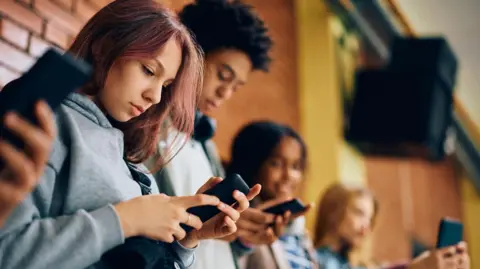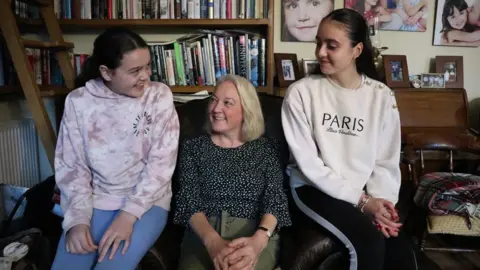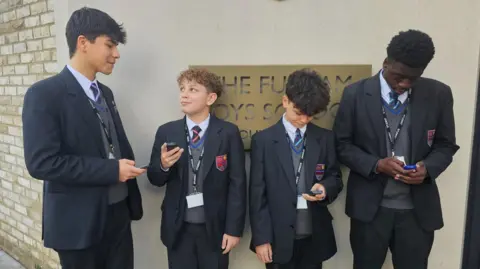 Getty Pictures
Getty PicturesBanning telephones in colleges will not be linked to pupils getting greater grades or having higher psychological wellbeing, the primary research of its form suggests.
College students’ sleep, classroom behaviour, train or how lengthy they spend on their telephones total additionally appears to be no totally different for colleges with cellphone bans and colleges with out, the lecturers discovered.
However they did discover that spending longer on smartphones and social media normally was linked with worse outcomes for all of these measures.
The primary research on the earth to take a look at faculty cellphone guidelines alongside measures of pupil well being and training feeds right into a fierce debate that has performed out in houses and colleges in recent times.
Dr Victoria Goodyear, the research’s lead writer, instructed the BBC the findings weren’t “in opposition to” smartphone bans in colleges, however “what we’re suggesting is that these bans in isolation are usually not sufficient to sort out the damaging impacts”.
She mentioned the “focus” now wanted to be on decreasing how a lot time college students spent on their telephones, including: “We have to do extra than simply ban telephones in colleges.”
The College of Birmingham’s findings, peer-reviewed and revealed by the Lancet’s journal for European health policy, in contrast 1,227 college students and the foundations their 30 totally different secondary colleges had for smartphone use at break and lunchtimes.
The faculties have been chosen from a pattern of 1,341 mainstream state colleges in England.
The paper says colleges limiting smartphone use didn’t appear to be seeing their supposed enhancements on well being, wellbeing and focus in classes.
However the analysis did discover a hyperlink between extra time on telephones and social media, and worse psychological wellbeing and psychological well being, much less bodily exercise, poorer sleep, decrease grades and extra disruptive classroom behaviour.
The research used the internationally recognised Warwick-Edinburgh Psychological Nicely-Being Scale to find out members’ wellbeing. It additionally checked out college students’ nervousness and melancholy ranges.
It requested kind academics about whether or not their college students have been on track, under or above goal in English and maths.
‘On their telephones on a regular basis’
Charlie acquired his first smartphone in 12 months 8 – however a strictly enforced ban meant he wasn’t allowed to carry it with him till he began sixth kind.
Anybody caught with a smartphone within the decrease faculty at Twyford faculty, west London, has it confiscated for the remainder of the time period, which senior workers say is such an “unpopular” punishment that it really works as a robust deterrent.
Charlie says the smartphone ban “forces you to hang around and chat with your mates”.
Now in 12 months 13, he thinks the ban in decrease faculty has “in all probability” helped him to spend much less time scrolling social media – however says a number of his buddies are nonetheless “on their telephones on a regular basis”.
 Branwen Jeffreys / BBC
Branwen Jeffreys / BBCColin Crehan, head at Holy Trinity Catholic College in Small Heath, Birmingham, feels a “ethical obligation” to assist college students study to make use of their telephones in a “secure and managed house”.
He says phone-related points, akin to units being a distraction from studying, are “miniscule” as a result of his college students worth the “freedom” they’ve been given to make use of them at break and lunch.
“It is such a pivotal a part of their lives outdoors of faculty. For [teachers to] then go into the realms of limiting that inside faculty, we’re finally going to set ourselves up for a battle which we’re not going to win,” he provides.
However college students at different colleges the place telephones are banned have instructed BBC Information they’ve seen advantages like much less bullying and higher social expertise – components not included within the College of Birmingham research. Its authors mentioned extra analysis was wanted on this space to attract any hyperlinks.
Ysgol Aberconwy, in Conwy, modified guidelines not too long ago in order that college students’ telephones are locked inside magnetic pouches except a trainer unlocks them to be used throughout class.
The college cites analysis suggesting rising loneliness at school, and the suggestion that time on social media is linked to lower life satisfaction for some children.
Georgie, 15, says earlier than the rule change, the environment at college “was fairly aggressive”.
“There was a variety of fights, and folks would simply pull out their cellphone and begin filming it. Lots of people would get fairly upset,” she mentioned.
Now, Georgie feels arguments don’t escalate a lot or as usually.
“Folks have gotten nearer, as a result of they’re speaking face-to-face,” she mentioned.
It’s a change Georgie’s sister Charlotte, 12, discovered “reassuring” to listen to about, as she began 12 months 7.
Head trainer Ian Gerrard says whereas bullying hasn’t been “fully eradicated”, the pouches have created “a secure house inside faculty” the place college students “needn’t fear about these issues”.
 Hope Rhodes/BBC Information
Hope Rhodes/BBC InformationRegardless of the dearth of clear-cut proof, Georgie’s mom Sarah says she “completely” helps Aberconwy’s coverage.
She says she has discovered it powerful not to have the ability to message her youngsters throughout examination time.
“It will be good to have the ability to typically talk with them to have the ability to say, ‘has every part gone all proper?'” she mentioned.
Different colleges have discovered that oldsters wanting contact with youngsters to be a sticking level when introducing new guidelines round telephones.
Inside just a few weeks of The Fulham Boys College in west London bringing in a “brick”-phones-only coverage in September, college students have been “over it”, head trainer David Smith says – however “teething issues” got here from dad and mom fearful about their youngsters travelling throughout the capital with out apps to assist them.
One scholar not too long ago acquired on a bus going within the improper path, and ended up on the different finish of the road to his dwelling neighbourhood – with out a smartphone on him to verify a map or name dwelling.
 The Fulham Boys College
The Fulham Boys College The Fulham Boys College
The Fulham Boys CollegeThe research could intensify the controversy round whether under-16s should be stopped from having smartphones altogether.
Some schools say it’s down to folks to behave.
The Conservative Get together is amongst these pressing the government to tighten up restrictions inside colleges.
Labour has previously said the reply may lie with a social media ban for under-16s like in Australia.
Responding to the College of Birmingham research, a authorities official mentioned academics already had “clear steerage” to handle cellphone use in a method that labored for his or her colleges.
The On-line Security Act, which is able to quickly come into impact, would defend younger individuals from dangerous content material and guarantee that they had an age-appropriate expertise on-line.
“Extra strong proof is required to succeed in clear conclusions on the impression of smartphones on youngsters, which is why we’ve got launched our personal analysis, led by the College of Cambridge, into the impression of social media on youngsters’s total wellbeing,” the official added.
Extra reporting by Branwen Jeffreys and Hope Rhodes.



